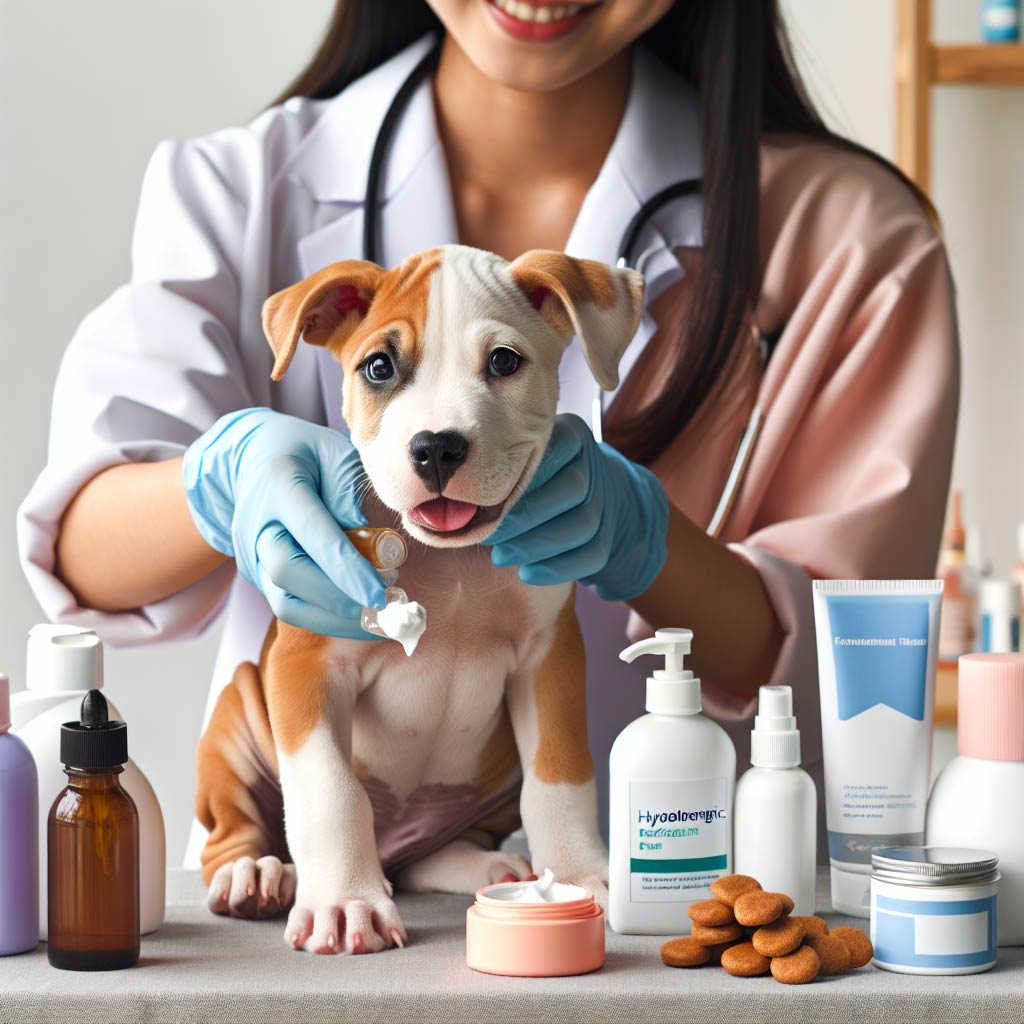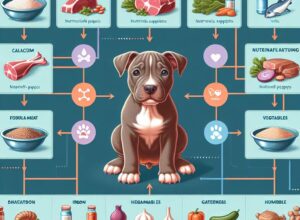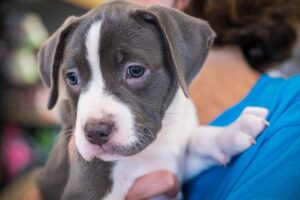
Key Takeaways for Pitbull Puppy Skin Health
When it comes to your pitbull puppy’s skin health, there are a few key things to remember:
- Be on the lookout for signs of allergies, such as itching, redness, and hair loss.
- Choose hypoallergenic and gentle grooming products to avoid irritating sensitive skin.
- Offer a balanced diet that supports skin health and consider hypoallergenic food options if allergies are suspected.
- Regularly check for fleas, ticks, and other parasites that can cause skin issues.
- Consult with your vet for a tailored approach to manage your puppy’s skin conditions.
Soothing Your Pitbull Puppy’s Sensitive Skin
Dealing with a pitbull puppy’s sensitive skin can be challenging, but with the right approach, you can help your furry friend feel better. Start by bathing your puppy with a gentle, hypoallergenic shampoo. Frequent baths can strip their skin of natural oils, so aim for a balance – not too often, but just enough to keep allergens at bay. After a bath, apply a soothing, dog-friendly moisturizer to keep their skin hydrated.
Easing Allergies with Proper Care
Allergies in pitbull puppies can be a real pain, both for them and for you. To ease their discomfort, it’s important to maintain a clean environment. Regularly wash your puppy’s bedding and any fabric they come into contact with using a fragrance-free detergent. If you notice your puppy is particularly itchy after playing outside, a quick wipe down with a damp cloth can remove allergens from their coat.
Recognizing Allergy Signs in Your Pitbull Puppy
Being aware of the signs of allergies in your pitbull puppy is the first step to managing their condition. Allergies can show up in many ways, but there are some common signs you can watch for. If you notice your puppy scratching more than usual, or if they seem to be constantly licking or biting at their skin, it’s time to pay closer attention.
Common Symptoms and Reactions
Here are some tell-tale signs that your pitbull puppy might be dealing with allergies:
- Excessive scratching or licking
- Red, inflamed skin
- Hives or rashes
- Chronic ear infections
- Runny eyes or nose
- Sneezing or coughing
- Swelling of the face, ears, lips, eyelids, or earflaps
Remember, these symptoms can indicate other health issues as well, so it’s always best to consult with your vet for an accurate diagnosis and treatment plan.
When to Seek Veterinary Attention
If your pitbull puppy’s symptoms are severe, persistent, or worsening, it’s time to head to the vet. An occasional scratch or sneeze may not be cause for alarm, but if you notice excessive scratching leading to bald spots, skin infections, or if your puppy seems to be in distress, professional help is needed. Your vet can run tests to determine the exact cause of the allergies and recommend a treatment plan that may include medication, dietary changes, or allergy shots.
Navigating Pitbull Puppy Skin Sensitivities
Managing your pitbull puppy’s skin sensitivities is a delicate balance. It starts with understanding what can trigger a reaction. Common irritants include certain fabrics, cleaning products, and even some types of grass or pollen. Pay close attention to when and where your puppy seems most uncomfortable and make adjustments accordingly. For instance, if they react after lying on a particular blanket, it’s time to switch to a different material or wash it with a hypoallergenic detergent.
Identifying Common Skin Irritants for Puppies
Every pitbull puppy is unique, but there are some usual suspects when it comes to skin irritants. These can include:
- Flea and tick bites
- Harsh grooming products
- Plastic food dishes, which can harbor bacteria
- Certain fabrics like wool or synthetic fibers
- Perfumed sprays or smoke
- Household cleaners with strong chemicals
By identifying and eliminating these common irritants, you can help minimize your puppy’s skin reactions.
Creating an Allergen-Free Environment
To give your pitbull puppy relief from allergies, aim to create an environment that’s as allergen-free as possible. Start with their immediate surroundings – ensure their bedding is washed regularly and made from hypoallergenic materials. Air purifiers can help remove airborne allergens, and regular vacuuming with a HEPA filter can trap dust and dander that may irritate your puppy’s skin. Lastly, keep your home smoke-free and limit the use of aerosol sprays or scented candles.
Choosing the Right Diet for Your Allergy-Prone Pitbull Puppy
The food your pitbull puppy eats plays a crucial role in managing skin allergies. An allergy-prone puppy may benefit from a diet that’s free from common allergens like beef, chicken, wheat, and soy. Instead, opt for novel protein sources such as salmon or kangaroo and complex carbohydrates like sweet potatoes. Always read the ingredient labels and choose a high-quality dog food that supports skin health with added vitamins and fatty acids like Omega-3 and Omega-6.
Importance of Balanced Nutrition
A balanced diet is the cornerstone of your pitbull puppy’s overall health, and this includes their skin condition. Nutrients like proteins, fats, vitamins, and minerals all play a role in maintaining a healthy coat and skin. Ensure your puppy’s food includes high-quality ingredients that provide these essential nutrients. A deficiency or imbalance can lead to skin problems, so it’s important to feed your puppy a diet that’s complete and balanced according to AAFCO standards.
Hypoallergenic Food Options
If your pitbull puppy has food sensitivities or allergies, hypoallergenic dog food may be the solution. These diets are formulated to exclude common allergens and often contain novel protein sources and limited ingredients to reduce the risk of an allergic reaction. Some hypoallergenic foods include:
- Novel proteins like venison, duck, or kangaroo
- Grain-free options to avoid common grains like wheat or corn
- Formulas with a single protein source to easily pinpoint allergens
- Added omega fatty acids to support skin health
- Probiotics to aid in digestion and promote a healthy gut
Always transition to a new food gradually to avoid upsetting your puppy’s stomach, and monitor their response to the new diet closely.
Grooming Tips for Sensitive Pitbull Puppy Skin
Grooming is more than just keeping your pitbull puppy looking good – it’s a vital part of their skin care. Regular grooming helps remove dead hair, distribute natural skin oils, and keep the skin clean. For puppies with sensitive skin, it’s important to groom gently to avoid causing irritation or accidentally triggering an allergic reaction.
Selecting the Best Skin-Friendly Products
When it comes to grooming products, not all are created equal, especially for sensitive-skinned pups. Look for shampoos and conditioners that are specifically formulated for dogs with allergies or sensitive skin. These should be free from harsh chemicals, dyes, and fragrances that can cause irritation. Natural ingredients like aloe vera and oatmeal can help soothe the skin, while hypoallergenic products reduce the risk of triggering an allergic reaction.
Grooming Routine for Allergy Prevention
Establishing a regular grooming routine can help prevent allergies from flaring up. Brush your pitbull puppy several times a week to remove dander and loose fur, which can hold allergens. Bathe your puppy every four to six weeks with a gentle, hypoallergenic shampoo to cleanse the skin without over-drying. After bathing, dry your puppy thoroughly, as moisture left on the skin can lead to irritation. Keep your puppy’s nails trimmed to prevent over-scratching, which can damage their skin and make allergies worse.
Integrative Approaches to Managing Puppy Allergies
When it comes to allergies, there’s no one-size-fits-all solution. Integrative approaches combine traditional veterinary care with alternative treatments to provide a comprehensive plan for your pitbull puppy’s allergies. This might include a mix of medications, dietary adjustments, and natural remedies to relieve symptoms and improve overall skin health.
Natural Remedies and Supplements
Many pet parents find success in adding natural supplements to their pitbull puppy’s regimen. Omega-3 fatty acids, found in fish oil, can reduce inflammation and help improve skin conditions. Probiotics are another great addition, as they support a healthy gut, which is crucial for a strong immune system. Other natural remedies include:
- Coconut oil, which can be applied topically for its moisturizing and anti-inflammatory properties
- Oatmeal baths to soothe itchy and irritated skin
- Apple cider vinegar, diluted with water, as a topical spray for hot spots or itchy areas
- Aloe vera to calm redness and swelling
- Chamomile tea, cooled and used as a rinse, for its skin-soothing benefits
Always discuss any supplements or natural remedies with your vet before adding them to your puppy’s care plan to ensure they’re safe and appropriate for your pet.
Advanced Allergy Treatments
For more severe cases of allergies, your vet may recommend advanced treatments. These can include immunotherapy, which involves giving small doses of the allergen to your puppy over time to build up their tolerance. Another option is prescription medications like corticosteroids or antihistamines to control severe itching and inflammation. In some cases, a vet may prescribe a special hypoallergenic diet or conduct allergy testing to identify specific triggers.
It’s important to follow your vet’s guidance closely with these treatments, as they can have side effects and need to be monitored carefully.
FAQs on Pitbull Puppy Skin Care
Can diet alone manage my puppy’s skin allergies?
Diet plays a significant role in managing skin allergies, but it may not be the sole solution for every puppy. A hypoallergenic diet can certainly help reduce allergic reactions and improve skin health. However, if your puppy’s allergies are caused by environmental factors or fleas, you’ll need to address those as well. It’s a good idea to work with your vet to determine if your puppy’s diet is contributing to their skin issues and to develop a comprehensive allergy management plan.
How often should I bathe my pitbull puppy with sensitive skin?
Bathing your pitbull puppy with sensitive skin should be done with care. Over-bathing can strip their skin of essential oils, leading to dryness and irritation. On the flip side, not bathing enough can allow allergens to accumulate on their skin and fur. The sweet spot is usually once every three to four weeks, but this can vary based on your puppy’s activity level and the severity of their skin issues. Always use a gentle, hypoallergenic shampoo, and follow up with a moisturizer formulated for dogs to keep their skin supple and itch-free.
Are there specific breeds of pitbull more prone to allergies?
While all pitbulls can develop allergies, there doesn’t seem to be a consensus on whether certain breeds within the pitbull category are more prone to them. Allergies are typically an individual issue that can be influenced by genetics, environment, and diet, rather than a breed-specific trait. However, if you’re concerned about allergies, it’s always a good idea to talk to breeders about the history of the puppy’s parents and any known skin issues.
What are the signs that my puppy’s skin condition is improving?
As you manage your pitbull puppy’s skin allergies, look for positive changes such as:
- Less frequent scratching or licking
- Reduction in skin redness and irritation
- Regrowth of fur in previously bald spots
- Decreased flakiness or dandruff
- Overall happier demeanor and increased playfulness
These signs indicate that your puppy’s skin is healing and that you’re on the right track with their allergy management plan.
Can my pitbull puppy outgrow its skin allergies?
Some puppies may outgrow their allergies as their immune system matures, but this isn’t guaranteed. In many cases, managing allergies is about controlling symptoms and avoiding triggers rather than outgrowing the condition entirely. With the right care and attention, many pitbulls can live comfortable, happy lives despite their allergies. It’s essential to maintain a consistent management plan and keep in close contact with your vet to adjust as needed.
In conclusion, managing your pitbull puppy’s sensitive skin and allergies can be a journey, but it’s one that’s well worth it for the health and happiness of your furry friend. By understanding the signs of allergies, choosing the right diet, grooming products, and creating an allergen-free environment, you’re setting your puppy up for success. Remember to stay patient and work closely with your vet to tailor an allergy management plan that suits your puppy’s unique needs. With love and dedication, your pitbull puppy can thrive and enjoy a vibrant, itch-free life by your side.
Frequently Asked Questions
What should I do if my pitbull puppy has a severe allergic reaction?
If your puppy is experiencing a severe allergic reaction, such as difficulty breathing, swelling of the face or hives, seek veterinary care immediately. These symptoms can indicate an anaphylactic reaction, which is a medical emergency.
Can regular vet visits help manage my pitbull puppy’s skin allergies?
Yes, regular vet visits are crucial for managing skin allergies. Your vet can provide valuable insight into your puppy’s condition, recommend treatments, and help you track the progress of your management plan.



